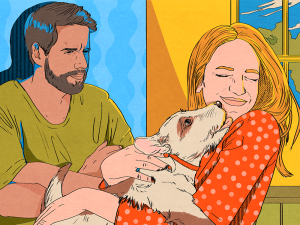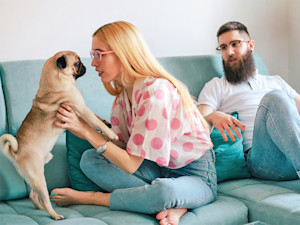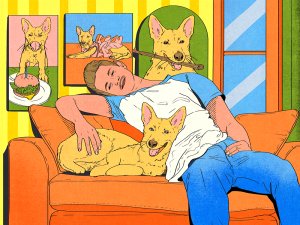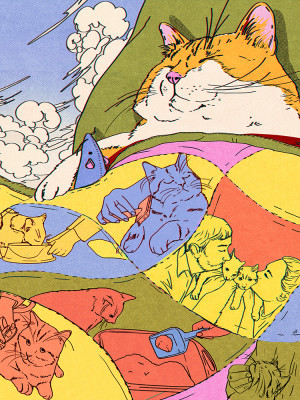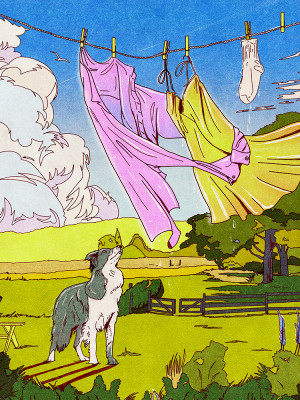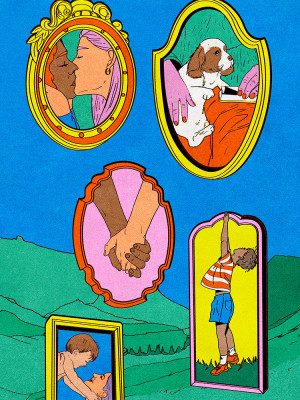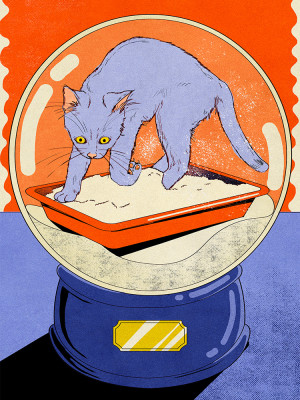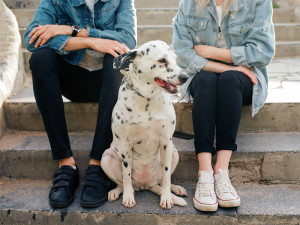
Help! I Think My Dog Is Trying to Sabotage My Relationship
One reader’s dog won't stop barking at her partner—what do you do with a jealous pup?

Share Article
Heavy Pettingopens in a new tab is a biweekly relationship advice column for pet parents — so you and your boo don’t end up fighting like cats and dogs over the cat and dog. Do you have a pet who is affecting your dating life and need some advice? Submit your anonymous questions hereopens in a new tab.
Dear Heavy Petting,
I have been dating my partner for six months, and I really love him, but my dog, who I have been with for six years, does NOT. Whenever he comes over, he growls or sulks in the corner. And if we ever show affection, the barking gets a bit out of control. It feels like my dog is super jealous of my partner and is doing everything she can to sabotage our relationship. It was kind of funny at first, but it’s starting to cause issues. He doesn’t really want to come over to my place as much, but I don’t want stay over at his without my dog. How do I help my dog stop being jealous of my partner? —Mom of envious dog

Get (totally free) deals for food, treats, accessories, tech, and way more pet parenting must-haves.
opens in a new tabDear Mom of envious dog,
We can understand how this situation may have been funny at first, but after awhile, not so much. Unresolved tension in relationships doesn’t remain funny for long. Because as wonderful as it is to know you are your pet’s favorite, if your partner is feeling unwanted — and constantly being barked and growled at! — it can be disheartening, to say the least.
While the barking is annoying, for sure, it seems your situation may go beyond just that. Even if your partner may not want to admit it, “seeing two creatures share a bond that they feel excluded from can be difficult,” says licensed mental health counselor Kelly Scott, of Tribeca Therapyopens in a new tab in New York City. “It can make them feel insecure and make them wonder what it is about themselves that [the dog] doesn’t like.”
It may also be leading to your partner developing resentments towards you and/or your dog, which, if left unaddressed, are almost guaranteed to worsen over time. “Resentment is what I call a sticky feeling,” Scott adds. “It is incredibly toxic in relationships and needs attention.”
Jealousy isn’t good for dogs, either. It stresses them out. And stress can cause them to act out in disruptive and destructive ways. But jealousy in pets isn’t necessarily the same as jealousy in humans. Indeed, what we call jealousy is often just a projection of our own feelingsopens in a new tab onto our pets in an attempt to make sense of their behavior.
When your dog starts barking every time you and your significant other embrace, you might tell yourself that they are doing it because they are jealous. Because that is a narrative that makes sense to you. After all, if you were in your dog’s position, watching your partner embrace another person, you’d be jealous, wouldn’t you? So, why shouldn’t your dog feel the same way?
The fact is, they might. But they also might not. Because we can’t talk with them or read their minds, we can never really know for sure one way or the other. Your dog could be jealous. They could also worry that you are in danger and want to protect you. Or, as is most often the case, according to celebrity dog trainer Jessica Jacobson of Dapper Dog Trainingopens in a new tab, “they could just want in on the love.” Not because you’re not giving them enough love as it is, but because when it comes to love, some dogs just can’t get enough.
Are they protesting in the form of non-stop barking? Treat time.
Whatever the reason, the issue that needs to be addressed is not the dog’s supposed and non-confirmable jealousy, but their behavior. In this particular situation, Jacobson has a few suggestions: “One way to address this behavior is by doing something positive, like tossing them a treat, before you embrace your partner,” she says.
To make this truly effective, though, you have to do it every time you embrace, which can be difficult if you prefer to be spontaneous with your affection and don’t always have treats on hand. “Another way is by immediately and adamantly crossing your arms and facing the other way as soon as your dog starts barking,” she suggests. “Keep in mind, though, that you will have to wait out the barking until you can resume your life, so only do this if you are able to really follow through. You could also simply hold the embrace and not separate until the dog stops barking, but this one can be tough if you have sound-sensitive neighbors.”
Stay patient as these issues resolve.
Also, be warned: Whenever you are trying to change a dog’s behavior, there is a possibility that the behavior could get worse before it gets better. “That’s not a bad thing, though,” Jacobson adds. “It means it’s working. If you’ve accidentally reinforced the behavior in the past, and they have learned that barking sometimes gets them what they want, they will push even harder to make it work when you are trying to make this change, so just stick with it.”
Per Jacobson, “Dogs tend to get branded with bad words [like jealousy] only when their behavior is dysfunctional.” But different dogs will express the same feeling in different ways: from overt aggression, to begging, to excitement, to turning away and acting forlorn.
“They could also act out in ways that are not observable at the moment of their distress,” she says. “For instance, a dog could have a sibling in the home and be ‘jealous’ because the other dog is getting things they desire — a certain toy, more food, more affection, etc. — but only express their upset when they are outside of the home, where they might, for example, become aggressive with other dogs they see on a walk.”
This is why it is so important to focus less on your dog’s feelings and more on their behavior. It’s also important to remember that all pets thrive on consistency and routine. When you bring a new person into the house, whether they are moving in or just spending the night sometimes, you are disrupting your pet’s routine.
Dog may get possessive over their favorite people.
What’s more, some dogs are what Jacobson calls “resource guarders”opens in a new tab and may view your affection the same way they view food or toys. Understanding that, it’s important, when incorporating another person into your life, to make sure your dog has more than enough resources.
“If they are not self-entertaining, give them a working toy like a slow feeder or Kong cone,” Jacobson says. “Anything that makes it harder for them to access their food. And make sure they have more than enough walks and exercise.”
You are probably already well aware of this, but changing a dog’s behavior can be a lot of work. So, there is absolutely nothing wrong with seeking professional help if and when you find that you are unable to do it alone. What ever way you get there, the important thing is that your dog is no longer acting in a disruptive way and coming between you and your partner.
Cats can also feel threatened by someone new.
While our reader is asking about a dog, cats also need special considerations when new people are added to the home (and we know cat parents are desperate to hear the tea on this). “Cats like to be in control and have a consistent routine and environment,” says certified feline behavior expert Cristin Tamburoopens in a new tab. “When someone new comes in, their territory becomes threatened and they don’t like that.”
Tamburo recommends being especially vigilant at the beginning of any change to alleviate your cat’s stress and mitigate any potentially disruptive or destructive behavior. “For folks who are starting to leave their cat at home more often — like more overnights at a partner’s place — I would recommend a timed feeder to help with their routine,” she says. “You can even keep your lights on timers or leave the TV or music on, anything to make the house feel more like it does when you are there.”
She also suggests that the new person in the house (even if they are just at the stage of visiting) dote on the cat with treats and play time whenever they are around. That way, the cat will develop positive associations with them and be happy to see them.
At the same time, Tamburo adds that “you can’t force a cat to do anything, and attempting to do so usually backfires.” So, you have to be patient and meet a cat where they are. “If a cat wants to hide, I might suggest you take a treat to them in their hiding spot and then leave. That way, you’re not forcing them out and forcing them to interact with you, you’re just doing something nice and letting them know you are there for them when they are ready.”
Do you have a pet who is affecting your dating life? Submit your anonymous questions hereopens in a new tab.

Charles Manning
Charles Manning is an actor, writer, and fashion/media consultant living in New York City with his two cats, Pumpkin and Bear. Follow him on Instagram @charlesemanningopens in a new tab.
Related articles
![an illustration of a cat with various cat chores: being groomed, scooping the litter box, feeding the cat]() opens in a new tab
opens in a new tabWhat to Do When Your Partner Isn’t Pulling Their Weight With Your Pet
So you don’t have to be annoyed anymore.
![a white dog stares up at a pink dress and yellow dress waving outside in the wind on a clothing line]() opens in a new tab
opens in a new tabWhen Is It Too Early to Get a Dog Together?
You’re in love, but is it irresponsible to add four paws to the mix? Here’s some input for your consideration.
![an illustration of a couple kissing, a dog, a couple holding hands, a child, and a child playing with a dog]() opens in a new tab
opens in a new tabIs Raising a Dog With Someone Anything Like Raising a Kid Together?
It’s the great puppy versus baby debate.
![an illustration of a cat inside a snowglobe]() opens in a new tab
opens in a new tabWhat Happens When the Love of Your Life Is Allergic to the Other Love of Your Life?
You don’t have to choose between your S.O. and your dog or cat — but here’s what may need to happen.
- opens in a new tab
Does Your Dog Hate When You and Your Partner Fight?
Here are the signs they’re trying to get you to stop.

